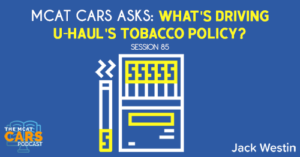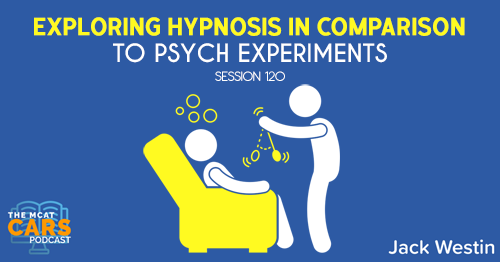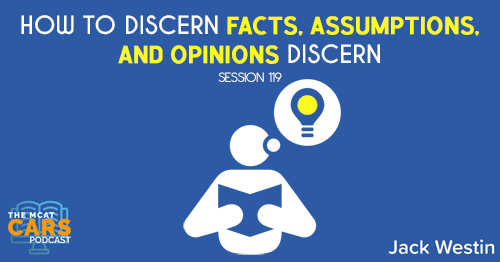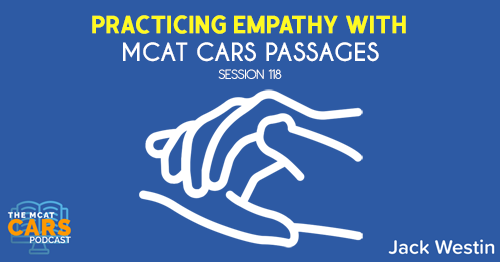Apple Podcasts | Google Podcasts
Session 85
Once again, I’m breaking down a passage with my friend and partner in crime, Jack Westin. If you’re struggling with your MCAT CARS section, which will likely affect the rest of your sections, go check out their free resources, including all of the Khan Academy resources.
Khan Academy recently announced that they are ending their support of the MCAT test on their platform. But because of the Creative Commons license that Khan Academy material was created under, Jack Westin has been able to put it on his website. So all the passages are there. All of the extra videos and other stuff will be there as well.
The theme of today’s article is subtle nuance. Sometimes, they point to something more important, but in a subtle way. And if you’re not careful when you read, you’re going to miss the point and the entire article.
So we’ll talk a lot about how to make sure you know exactly where the author’s headed. There are students who can’t find the main idea. They don’t understand why the author wrote the passage or the article. And sometimes, those little things can really help and make a big difference in your understanding.
Listen to this podcast episode with the player above, or keep reading for the highlights and takeaway points.
Link to the article:
https://reallifemag.com/draining-the-risk-pool/
The rental company U-Haul made headlines recently when it announced that its employees would be prohibited from using nicotine of any kind. The policy, which went into effect on February 1 in 21 states across the U.S., caused a stir, as commentators were quick to point out how invasive it was, undermining employees’ autonomy not merely on the job but in their personal lives. The company framed the decision as an effort to create a “culture of wellness.” Sure, it might seem paternalistic, but really U-Haul is looking out for the best interests of its “team members” by taking a tough-love approach to their bad habits. In reality, this is likely to mean that people who don’t smoke (or vape or chew) will get hired over those who promise to quit. Bonus: no more employees sneaking away for smoke breaks.
U-Haul is not the only company to prohibit nicotine, and it is far from the first to implement policies that authorize the monitoring of employees’ behavior on and off work. Corporate wellness programs, as Gordon Hull and Frank Pasquale detail in this 2018 paper, are often driven by concerns that exceed supporting healthy habits or even cutting down on “time theft.” They are in fact the insidious product of the U.S.’s unique entanglement of employers and health insurers, which works to create leverage over employees who have little control over the terms of their coverage. Ultimately, wellness programs are about exercising that leverage, reducing the risk profile of employees and thus cutting the employer’s costs for health insurance plans.
Once initiated, corporate wellness programs pervert the posture of caring to justify the implementation of intrusive technologies. Such programs, for instance, will typically offer incentives if people use certain data-collecting devices, share personal data, or meet regular quantified goals. This might mean wearing fitness trackers, using apps to track your eating habits, or recording your moods in a digital diary — all valuable data an insurer would check for compliance and use it to extrapolate other useful underwriting information.
To paraphrase economist Joan Robinson’s famous line about exploitation, the misery of health insurance under capitalism is nothing compared with the misery of not being insured at all. But the difficulty for many Americans simply to acquire health insurance shouldn’t distract us from the inseparable issue of how to avoid being screwed, abused, scrutinized, and controlled by our insurers. While we are absorbed by trying to overcome the misery of getting it, there are major innovations intensifying the complications of having it.
[03:25] Paragraph 1, Sentence 1
The rental company U-Haul made headlines recently when it announced that its employees would be prohibited from using nicotine of any kind.
Jack says:
It’s a straightforward sentence. U-Haul is a pretty popular company.
[04:00] Paragraph 1, Sentence 2
The policy, which went into effect on February 1 in 21 states across the U.S., caused a stir, as commentators were quick to point out how invasive it was, undermining employees’ autonomy not merely on the job but in their personal lives.
Jack says:
This expands a little bit. The fact of the matter is U-Haul has prohibited they’ve banned nicotine. But what the article really wants to go into is whether or not this is a good idea, whether or not this is fair. That’s a little deeper to understand. And that’s the way that you have to really try to read these.
When you do these passages, you will undoubtedly bring in your bias perspectives. And you will forget that you have to stick to the author when you answer the questions. Once you realize that’s what the test is all about, you have two options. You can continue. Or you can adapt and realize that the more objective you are in just understanding and not bringing in your own opinions is the best.
Question everything you read and think about whether it’s right or wrong. But that doesn’t mean you have to repaint the picture the author’s providing or inundate the questions with your own perspective. Just understand it for what it’s saying. And don’t be quick to judge it.
'Read and have an opinion, but don't cast your opinion onto the author.'Click To Tweet[07:16] Paragraph 1, Sentence 3
The company framed the decision as an effort to create a “culture of wellness.”
Jack says:
The company wants their employees to be healthy. There’s a word here – framed – that kind of makes it seems negative. It’s sort of like a manipulative situation. When you frame something, it’s like you’re putting it into an angle to make it more believable.
So that’s something that you may want to catch onto. The author’s trying to paint this as something that companies are doing to make themselves look pretty good.
[08:02] Paragraph 1, Sentence 4
Sure, it might seem paternalistic, but really U-Haul is looking out for the best interests of its “team members” by taking a tough-love approach to their bad habits.
Jack says:
The author here might seem paternalistic, and it’s a word that students may not pick up on. Paternalistic meaning like being your father. They’re being your parent in this decision. U-Haul is looking out for the best interest of its team members by taking a tough-love approach to bad habits.
The fact that “seem” is italicized means that it’s probably not paternalistic at all. It’s sort of a sarcastic remark. It also quotes team members. And again, the author is debating whether they’re really team members or slaves.
These are all speculative interpretations, but they’re not bad assumptions that we can make. It’s just not necessary. So just keep reading until the author really clears it up.
It does say it’s tough-love to their bad habits. Again, we don’t really know their motive. We don’t really know why they’re doing this. So until we keep reading, we just won’t know. It’s not a good idea to derive anything like you’re suggesting.
“Just keep staying neutral. Definitely look at the hints but you don't want to go too far.”Click To Tweet[10:03] Paragraph 1, Sentence 5
In reality, this is likely to mean that people who don’t smoke (or vape or chew) will get hired over those who promise to quit.
Jack says:
They’re saying that for two people who aren’t already hired, the person who doesn’t smoke or vapor or chew will get hired over one who says they’d quit when they’re hired.
[10:41] Paragraph 1, Sentence 6
Bonus: no more employees sneaking away for smoke breaks.
Jack says:
The company says it’s for the culture of wellness. Now, the motive is way more clear. They come in from this kind of parental kind of they’re trying to help their employees but it’s really to help themselves and save time and money of course.
[11:36] Paragraph 2, Sentence 1
U-Haul is not the only company to prohibit nicotine, and it is far from the first to implement policies that authorize the monitoring of employees’ behavior on and off work.
Jack says:
The author here saying it’s not just U-Haul that’s doing this because there are other companies that are doing this.
[11:58] Paragraph 2, Sentence 2
Corporate wellness programs, as Gordon Hull and Frank Pasquale detail in this 2018 paper, are often driven by concerns that exceed supporting healthy habits or even cutting down on “time theft.”
Jack says:
Now, we’re bringing in some expert opinion here. There’s this 2018 paper written by these two guys. And they say that it’s driven not just by these healthy habits and concerns for healthy habits, or even cutting down time theft. They haven’t said what yet, but they’re saying it just goes beyond that.
[12:40] Paragraph 2, Sentence 3
They are in fact the insidious product of the U.S.’s unique entanglement of employers and health insurers, which works to create leverage over employees who have little control over the terms of their coverage.
Jack says:
The authors of this paper are saying that it is hard for someone who doesn’t know how U.S. healthcare works, how we have health care that’s tied to your employer, your job. It’s detailing that this is potentially a side effect of that.
As long as you understand that there is some kind of entanglement of employers and health insurers. Meaning the bosses, the corporations, the big companies, and people who run businesses or manage them. That just sounds like health insurance. And everyone knows what health insurance is. You don’t need to know a lot about it, but you should just know that there is some sort of weird relationship between companies and health insurance, which is causing all of this to happen.
Then this leads to employees who basically have little control. The bigger point the author’s trying to make could be hard to understand. And if you miss this sentence, if you didn’t realize this is where they’re really trying to head to, you may be caught up on what they said earlier in the first paragraph. Then you may potentially miss the main idea of the passage.
[14:34] Paragraph 2, Sentence 4
Ultimately, wellness programs are about exercising that leverage, reducing the risk profile of employees and thus cutting the employer’s costs for health insurance plans.
Jack says:
The authors of the paper say that these wellness programs are to ultimately help the bottom line for the employer cutting health care costs.
So it’s not even about saving time due to smoke breaks or about being good to them and helping them with their health. It all comes down to these health insurance costs.
[15:19] Paragraph 3, Sentence 1
Once initiated, corporate wellness programs pervert the posture of caring to justify the implementation of intrusive technologies.
Jack says:
It looks like a little bit of a switch here talking about intrusive technologies. The author here says once you start this, then it looks like it potentially leads to this other stuff too.
This intrusive technology stuff is only in regards to health. Again, keep that in mind. I would visualize that and understand that, but it could lead to greater repercussions we don’t know.
[15:56] Paragraph 3, Sentence 2
Such programs, for instance, will typically offer incentives if people use certain data-collecting devices, share personal data, or meet regular quantified goals.
Jack says:
It seems like a win-win, but the author again is sort of painting this as a bad for the employee because it’s intrusive.
[16:31] Paragraph 3, Sentence 3
This might mean wearing fitness trackers, using apps to track your eating habits, or recording your moods in a digital diary — all valuable data an insurer would check for compliance and use it to extrapolate other useful underwriting information.
Jack says:
The author is saying it’s not necessarily an issue, but the author is saying here how the data can be used. Again, following along the same lines of intrusive.
[17:09] Paragraph 4, Sentence 1
To paraphrase economist Joan Robinson’s famous line about exploitation, the misery of health insurance under capitalism is nothing compared with the misery of not being insured at all.
Jack says:
They’re bringing in Joan Robinson, talking about exploitation. She says that you have this health insurance under capitalism, which is pretty bad, but not having insurance at all is even worse.
So there are two separate issues. The author’s trying to make that distinction, for sure.
[17:51] Paragraph 4, Sentence 2
But the difficulty for many Americans simply to acquire health insurance shouldn’t distract us from the inseparable issue of how to avoid being screwed, abused, scrutinized, and controlled by our insurers.
Jack says:
It sounds like the author’s more worried about the intrusiveness of health insurance. That’s the point the author is more passionate about. That’s what the author really cares more so than just talking about not having health insurance at all.
[18:52] Paragraph 4, Sentence 3
While we are absorbed by trying to overcome the misery of getting it, there are major innovations intensifying the complications of having it.
Jack says:
They talk about how hard it is to get it and some modifications over here all the while are getting deeper and deeper into all of your data and what you’re doing.
[19:24] Main Idea
It’s about all the data collection and how the insurance companies are monitoring you too much. The author is really focused on just the intrusive technology aspect. That kept repeating and that seems to be the most important angle about all this. It’s definitely this idea of how health insurance and these capitalists kind of companies interact and how that impacts employees.
It seems like a clear passage, but they’re talking about insurance. And most students will take all this and try to make their own decisions and form their own opinions.
The problem most students have is they don’t even understand this is going on and what the author is saying. Hence, the key to making your own opinion about something is make sure you understand what the author is even trying to imply or convey. That’s just as important as discussing their bias.
If you can’t understand what you’re reading, not only will you misconstrue the author’s opinions. You’re also going to bring in your own opinions on things that maybe the author didn’t even talk about.
'Students go into these questions blind, not sure how to answer the questions and not sure what the questions are even asking.'Click To TweetLinks:
SEARCH SITE
SEARCH SITE
LISTEN FOR FREE












